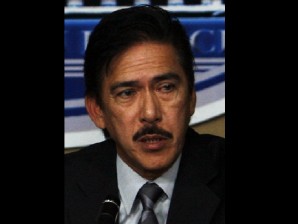Sotto tied to pork waste
TERESA, Rizal—A portion of Sen. Vicente Sotto III’s Priority Development Assistance Fund (PDAF) went to the purchase of garbage deodorizer in the municipality of Teresa although the town’s officials said they had made no request for the microbial inoculant that remained unused, the Inquirer has learned.
In another example of the misuse of pork barrel funds, Sotto gave to Teresa town P1.5 million from his 2012 PDAF on May 15 last year, according to the official website of this municipality.
The money went to purchase 2,140 liters of the inoculant Effective Microwealth Probiotic (EMP) from Innsbruck International Trading.
Records of the Teresa accounting office showed that the EMP was for an antidengue program, although there was no outbreak of the disease in the town.
Innsbruck was the same company that reportedly received P20 million from Sen. Lito Lapid’s pork barrel for questionable antidengue programs in several Rizal towns. The Inquirer tried to contact Innsbruck but learned that it was neither operating out of its given address in Rodriguez, Rizal, nor at a San Juan City address.
Article continues after this advertisementAside from Teresa, the municipality of Tanay, also in Rizal, received P5 million from Sotto, also on May 15, 2012, for the “probiotics or medicines for (a) medical mission,” according to the website of the Department of Budget and Management (DBM). Tanay did not request a mission, according to the town’s officials.
Article continues after this advertisementSought for reaction, Sotto said he did not tolerate any irregularity in the use of his PADF. He said all the projects funded by his office were aboveboard because his staff was very careful about documentation.
“It seems someone is trying to pull a fast one,” he said, when informed that the projects in Teresa and Tanay had not been requested by the municipalities but were offered to them.
“According to my staff, we have copies of the requests of all that we give funds to for whatever projects,” Sotto told the Inquirer on Saturday.
“(My staff) doesn’t make me sign unless they’re sure because of the huge number of those who make requests,” he said. “And some of them don’t get anything.”
Sotto said he would support an investigation by the Senate or a law enforcement body like the National Bureau of Investigation.
“I will not tolerate any illegal use of my PDAF,” he said. “Seriously now, even I am being dragged into this,” he said in Filipino, referring to the pork barrel scam revelations coming out almost daily.
Lapid pork funding
Official records showed Lapid gave P20 million of his PDAF to the municipalities of Teresa, Baras and Pililla, all in Rizal, and to Polillo in Quezon, with each town receiving P5 million worth, or 7,142 liters (320 containers), of the EMP solution.
Morong, also in Rizal, received P5 million from Lapid for the “purchase of antidengue medicines” on Oct. 7, 2011, also according to the DBM website.
This despite the low incidence of dengue in those municipalities, according to their respective municipal health officers.
Lapid issued a statement on Friday denying any irregularity in the disbursement of his pork barrel.
But Pililla municipal planning officer Dariel Ricardo said: “It was offered to us. Syempre matutuwa kami (Of course, we would be glad).” Ricardo in a phone interview said it was the senator’s office, through a staff member whose name he could not recall, that offered the financial assistance.
“All we had to do was provide them with a (project) proposal,” he said.
In Teresa, environment officer Marlon Pielago, whose office took charge of distributing the EMP solution to the communities, said that neither he nor the former mayor, Rodel de la Cruz, had asked for the inoculant.
In fact, Pielago added, the town preferred not to shell out municipal funds for the enzyme, “because we could make it ourselves.”
He said the solution consisted of red sugar and spoiled rice mixed with water to culture the bacteria that speed up garbage decomposition.
“But this came to us for free so we may as well accept it,” Pielago said of the pork-funded inoculants.
No bid documents
Around 100 containers of EMP were stacked at the Teresa Materials Recovery Facility and another 100 in the Baras municipal gymnasium.
The Inquirer asked to see the bid documents, but none of the municipalities were able to show any.
In Morong, budget officer Yolanda Alcantara said her office did not keep records of such transactions.
When pressed on how Innsbruck was able to win the contract just weeks after Lapid’s allotment order was issued by the DBM, the Teresa municipal accountant, Lily Mendoza, said all the papers had been submitted to the Commission on Audit.
In Baras, budget officer Almario Matawaran said no bidding took place. “We were told that (Innsbruck) was the exclusive (distributor of EMP),” he said.
The respective municipal health officers, apparently unaware of the supposed antidengue fund, were surprised when told about the allotment.
“We made no request for such funding. I have no knowledge of that transaction,” said Dr. Menchita Celetra, Teresa health officer who added that she would rather the municipality received actual medicines.
Baras sanitary officer Alberto Pendre was disappointed the fund went elsewhere when all the town could afford was an information campaign against dengue. “Sayang (What a loss)!” said Dr. Norberta Pedrosa, Morong health officer.
